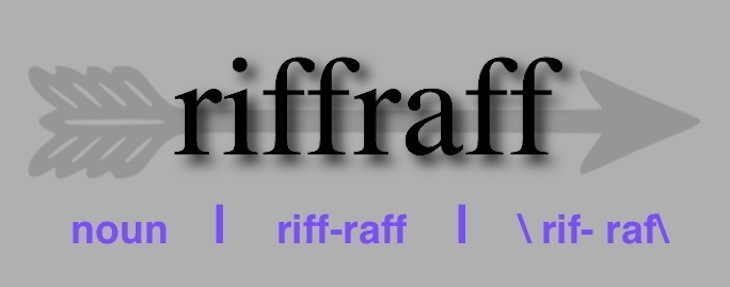Riff Raff: Recipe support
by December 17, 2022 9:50 am 888 views

Dr. Seidensticker, a college professor, made me a cassette tape of recordings of music by composers Haydn, Stravinsky, Wagner, and others, although he said Wagner could be tough to follow because he was too abrupt.
Was then not sure what abrupt meant in terms of symphonic music. Still not entirely sure, if being honest. Probably a few of y’all out there who know.
But it was the first time an adult, a smart adult with a crazy-cool beard and those little round glasses took an interest in helping a rural kid with limited knowledge of sound understand the evolution of music. Pop music, country and rock-n-roll, are the children of the works of Bach and Mozart and a bunch of other European fellas with consonant-heavy names and funky wigs. There was a musical genetic tree, so to speak, connecting Wolfgang to Hendrix, and Johann to to the three-chord chops of Angus Young.
Several years prior to Dr. Seidensticker, who also turned me on to Brubeck, there was Mrs. Murray, my first grade teacher. We watched an egg hatch into a chick. It was my first taste of an addiction to learning more about the world around me.
Mrs. Dickey was the first adult outside my family to tell me I was smart, but could do better if I applied myself. She didn’t use the phrase, “applied myself,” but told me such in a third grade vocabulary that made me want to do anything I could to ensure she’d never again have to tell me to apply myself.
“They’re perfect,” she said, erasing a ton of self-conscious insecurity when that third grade kid with freckles and big ears had to begin wearing clunky prescription glasses.
Mrs. Kendall would read to her fourth grade class as a reward for good behavior. I could not get enough of Encyclopedia Brown, which led me to The Hardy Boys, and Nancy Drew, and hours of consumption of the Mutiny on the Bounty trilogy. She subversively turned me on to a love of reading and the sanctuary of libraries. With a library card, a poor country kid didn’t need a dime to explore with the turn of a page new worlds and old lessons.
The continued fascination with evolution and the chemical interactions that charge life was fueled by Mr. Warren. It was in those junior high years that Sunday school readings began to take a back seat to the awareness of science and its pursuit of experimentation, theory and facts.
Theater was more than just something weird folks did in New York and other big cities, was the lesson from Nancy Fikes in my high school years. Dr. Ardith Morris would continue the theatric exposure in my university years, giving me chances to fail and succeed and grow and learn and feel and emote beyond what was deserved and often understood. I’ll be damned to speak of a better way than theater to absorb the critical soft skills required to significantly improve the chances of success in our short time here in the stage lights of life.
Coach Swofford was a giant of a person who taught me it was okay to be a giant of a person if the goal of that person was to help others. He allowed me opportunities on the football field that gave a young man self confidence who otherwise had created a macho facade to hide deep, sometimes crippling, anxieties. In what was likely a passing comment for him in a frustrated attempt to motivate me to do better, he once told me, “Trust your talents.” The number is likely well beyond 100 the occasions in my adult life that reminding myself to trust my talents resulted in either overcoming an obstacle, taking a chance, or building upon an opportunity. Or all of that.
Mr. Mumert, a college faculty advisor, guided a young mind through the challenges, opportunities and responsibilities of being a college newspaper editor. He encouraged me to consider the value and impact, the purpose and necessity of every printed word – no matter if the topic was complicated foreign policy or silly sorority girl cliches. I’ve failed his guidance a few times, but the batting average is significantly higher because of his many polite tips.
Some lessons learned from teachers, professors and college administrators weren’t, to be sure, lessons they intended to impart. Lessons like, just because an adult is in a position of authority doesn’t mean they deserve to be there. Or lessons like, hold your tongue with that particular educator who is nothing more than a brash bully in a good suit protected by institutional privilege, because his time is coming. And lessons like, sometimes it’s worth it to not hold your tongue in exchange for some time in the principal’s office. You know, pick-your-battles kind of lessons.
The point is, educators in the classroom, college newsroom, theater stage, or football field are all part of the recipe of me. They were life-changing ingredients. A more pointed point is 99.9% of y’all have similar stories. You, Kind Reader, have a list of educators who are part of the recipe of you.
Let’s you and me do more to remember these people – especially those in our K-12 public schools – and the things they are asked to do, the lives they are asked to change, the myriad rules they are required to follow, the resources they are given, and the resources they are not given. Let’s consider that the bank teller, the restaurant worker, the police officer, the operating prep nurse, the military member, the airline pilot, and the political candidate all have a Mrs. Dickey and a Coach Swofford.
Let’s think about what we collectively should and can do to put politics aside and make better their environments.
